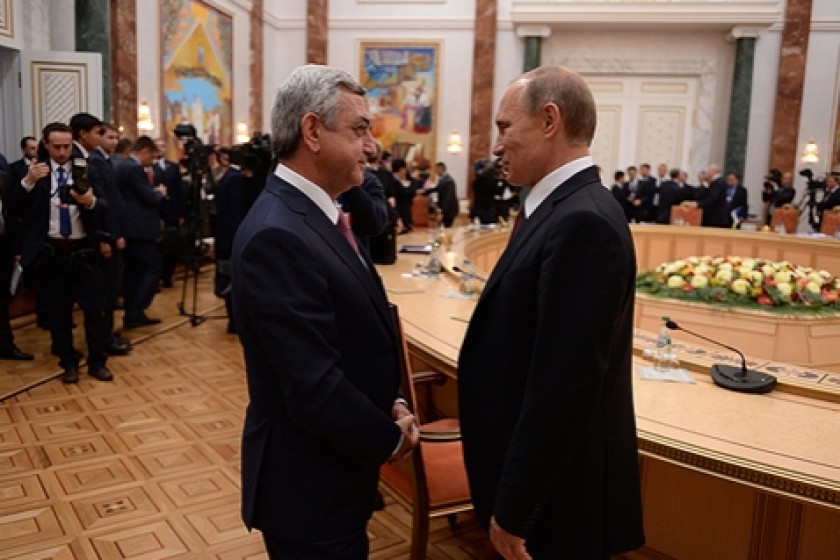
Armenia's Eurasian Accession; Security Guarantee the Game Changer
By Pietro A. Shakarian
On Friday, 10 October,
The decision by the Armenian government has sparked debate in Armenian society about the respective benefits of the two rival blocs. It is true that Armenians have long sought to integrate their country with
However, even though an Armenian or Georgian nationalist would never admit this, it was the Russian Empire in the 19th century that effectively reconnected both Georgia and, at least, eastern Armenia with Europe directly for the first time since the Middle Ages. It was also the Soviet era that helped develop the infrastructure and national culture of both countries. In
Today, Russia continues to play a major role in Armenia's economic and energy sectors. However, the most significant factor in the Russo-Armenian relationship is security.
Today, Russia's position as Armenia's security guarantor remains. It continues to act as a deterrent to
In fact, the arrangement is beneficial not only for Armenia, but for Russia as well.
By contrast, even though the EU offers Armenia infrastructural improvements and institutional reforms, it is not a "magic bullet" or a "cure-all" remedy for Yerevan. In fact, the EU is still struggling in its recovery from the Eurozone crisis and cannot afford to over-expand itself without threatening the very viability of the European project.
The economies of its newest East European member states – Bulgaria, Romania, and Croatia – have performed horribly since the financial crisis began and have stopped converging with their Western counterparts. These three have likewise remained thoroughly corrupt and another, Hungary, has moved backwards toward illiberalism under Viktor Orbán.
All of this indicates that the EU is no guarantee for the automatic improvement of Armenia's state institutions. Simply joining the EU does not make a society "democratic." It must ultimately go through this process on its own. Consequently, democratization does not depend solely on outside forces like
There are demographic concerns with the EU too. Since joining, many of the new Eastern European member states have experienced massive emigrations to the more developed Western countries. Proponents of the EU point to earlier examples, such as
However, since the Eurozone crisis, there are indications that these emigrants are not returning, especially because there are so few employment opportunities in their native countries. The emigration rate has been particularly high in the
Even more alarming, the Eurozone crisis and the major rise of unemployment have triggered a mass emigration of southern Europeans from Greece, Portugal, Spain, and Italy to the more prosperous West and North, again, without any immediate signs of return. For
Most significantly, the EU lacks security mechanisms to help Armenia in the case of an attack by its neighbors. Even if it did,
Therefore, it is increasingly clear that given Yerevan's geopolitical position, its simultaneous pursuit of both the EU Association Agreement and the Moscow-backed Eurasian Union was likely a gambit by President Serj Sargsyan in order to secure the best possible terms for Armenia.
Judging by the body language at Sargsyan's Moscow meeting with Putin, at which his decision to join the Eurasian Union was initially announced, this seems to be the case. Indeed, it is far more likely than the standard narrative by the Western media and pro-Western Armenian oppositionists who claim that Putin simply "pressured"
Instead, it is more probable that Moscow put forward a deal of enhanced security guarantees for Nagorny Karabakh, which along with Armenia itself is constantly being threatened by Azerbaijan. This would explain why Sargsyan, himself a Karabakh native, was grinning at the
After Yerevan made its initial announcement in September regarding its decision to pursue the Eurasian Union, six days later, Georgia's Bidzina Ivanishvili announced too that Tbilisi may consider joining the Eurasian Union, provided that it be "advantageous for our country." His statement was followed by a promising thaw in Russo-Georgian relations, culminating in Putin's invitation to newly-elected Georgian President Margvelashvili for a future meeting, announced at the Sochi Winter Olympics.
However, interrupted by the crisis in Ukraine, that summit was postponed indefinitely. Neither
Meanwhile, officials in Yerevan moved quickly to ensure rapid accession of Armenia into the Eurasian Union. However, the process was slowed by the fact that
Yet, this saga is not over. If the
Pietro A. Shakarian is an MA graduate student at the Center for Russian, East European, and Eurasian Studies (CREES) at the University of Michigan in Ann Arbor. He earned his BA in History from John Carroll University in 2012 and his MLIS from Kent State University in 2013. He also serves as a member of the editorial board for the Gomidas Institute in London and has written analyses on Russia and the former USSR for The Nation and Russia Direct.
 Videos
Videos Photos
Photos
Comments (3)
Write a comment